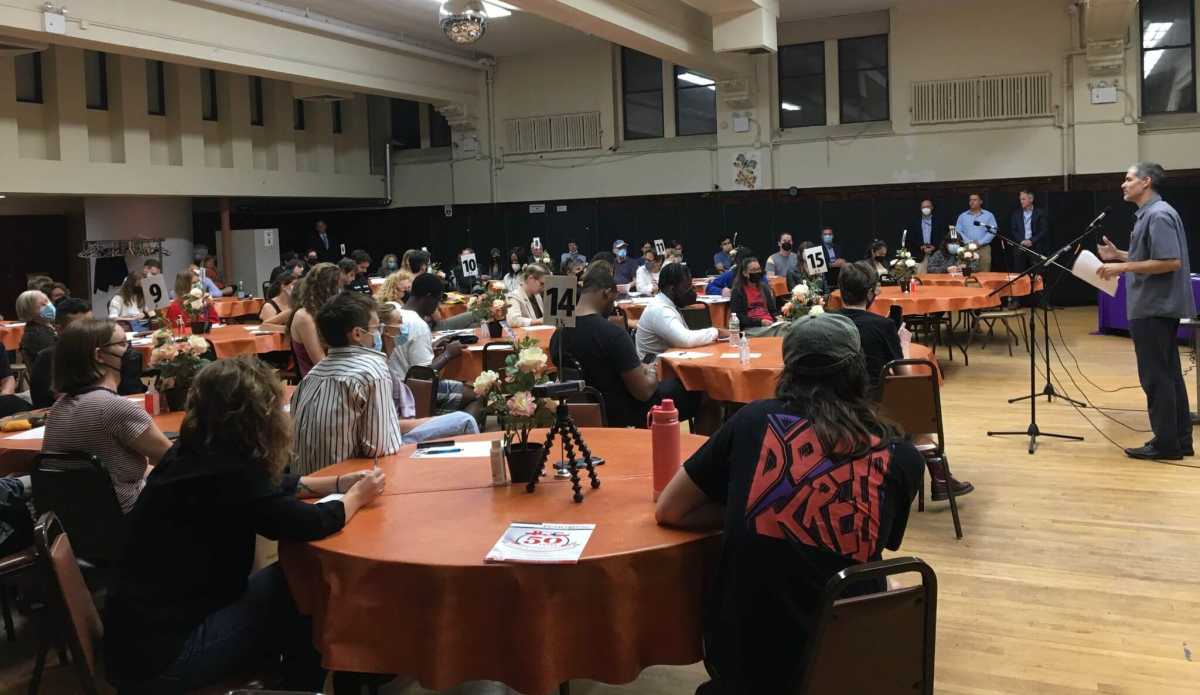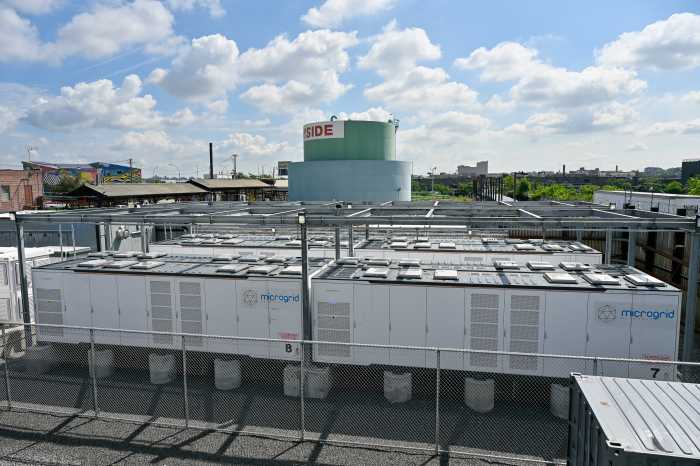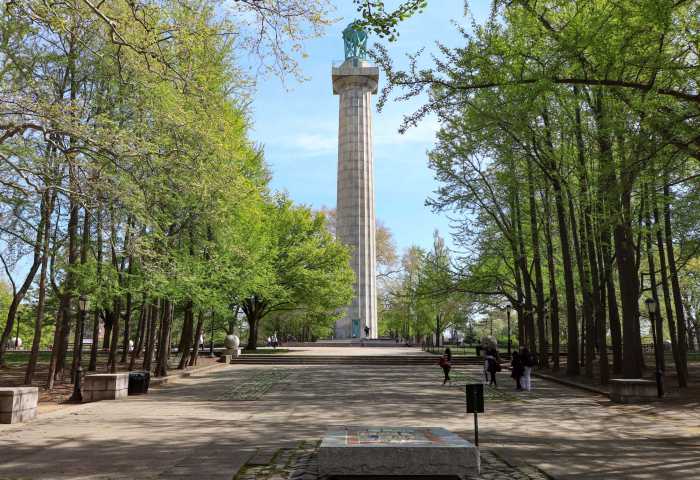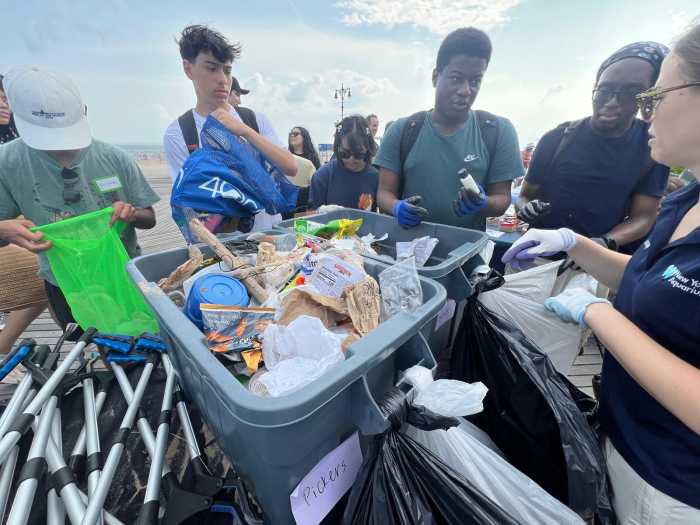National Grid received a chilly reception in Greenpoint on Sept. 21 as they met with the public to discuss a proposed customer rate hike that would pay for new fossil fuel infrastructure at the Greenpoint Energy Center.
“We’re here tonight to talk about National Grid’s request to spend $65 million of what will be our ratepayer money to build two new liquified natural gas vaporizers on the banks of Newtown Creek,” said local Assemblymember Emily Gallagher at the Wednesday evening meeting. “Investing in new fossil fuel infrastructure in 2022 is climate denial, and to make all of us pay for that climate denial adds insult to injury.”
The utility giant, which provides natural gas to more than 1 million customers in Brooklyn, Queens and Long Island, has for years been pushing to build two new LNG vaporizers, which turn stored liquid gas into a vapor so it can be sent to customer’s homes, at the Maspeth Avenue depot.
A potential rate hike and a ‘fresh set of eyes’
Before construction can begin, the state’s Public Service Commission has to decide whether or not the utility will be able to recoup construction costs by raising prices.
Last summer, the PSC approved a general rate hike for National Grid, but added some stipulations — namely, that fossil-fuel Long Term Capacity projects, like the new vaporizers, are subject to additional review and public feedback.
More than 100 people in total attended two in-person sessions on Wednesday. The first, a midday meeting at Cooper Park Houses, the public housing development a few blocks from the Maspeth Avenue depot, was primarily attended by residents of the complex, a National Grid representative told Brooklyn Paper.
The company presented a slideshow explanation of the proposal at both sessions, followed by a question-and-answer session and the opportunity for attendees to provide three-minute statements. It also held two virtual sessions on Sept. 20.
“What this proposal is being subjected to is review by an independent consultant, who actually is in attendance this evening,” explained Maureen Leary, the PSC administrative law judge overseeing the rate case. “It’s important because it’s a fresh set of eyes.”
That “fresh set of eyes” will determine whether or not National Grid’s proposal meets a number of criteria required for a rate hike to be approved, she said, including greenhouse gas emissions. In its 2021 decision, the PSC declared that the state’s Climate Leadership and Community Protection Act, which aims to dramatically reduce New York’s emissions, applies to that rate case and all future rate hikes.
National Grid says the new vaporizers are a necessary and relatively climate-friendly addition to the facility, which houses six older vaporizers. The vaporizers boot up only on the coldest days of the year, when demand for gas is highest and the utility has to tap into its two enormous LNG storage tanks.
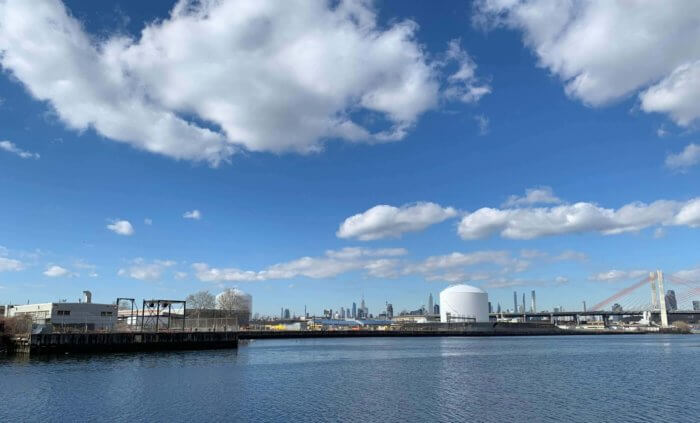
The company prepares a demand forecast that projects how much gas they would need if all of their customers were using gas on the coldest day of the year, said Philip Decicco, vice president and deputy general counsel at National Grid.
As the permitting process has stretched on, National Grid has repeatedly warned that further delaying the construction of the vaporizers could lead to an inability to meet demand for gas in the winter — but those warnings have yet to come to fruition.
“We’ve had relatively mild winters the last two winters, although we’ve had some really cold days,” Decicco told Brooklyn Paper ahead of Wednesday’s meetings. “I think one of the challenges is obviously the unpredictability of weather going forward. Even with global warming, you could see extreme weather conditions including extreme cold conditions.”
Not being able to supply gas on those days would have significant consequences, Decicco said, and “real health and safety impacts in a way that it would be irresponsible for us not to plan for.” The vaporizers would also help to provide gas if the supply from other sources was interrupted.
But many activists and local leaders are not convinced that the vaporizers are truly necessary, and doubt National Grid’s claim that they would reduce emissions at the facility. If the PSC approves the rate hike, the utility still needs new air pollution permits from the state’s Department of Environmental Conservation, which has several times delayed issuing its decision.
Brian Wood, a Greenpoint resident, said he spent a recent weekend installing a pump and sandbags in his garden-level apartment because it flooded badly last hurricane season. It was the first time the apartment has flooded in his ten years of living there.
“My public comment is that I am being asked to pay additional money to expand natural gas infrastructure in the place that I call home,” Wood said at the Sept. 21 session at the Polish and Slavic Center on Java Street. “I buy that it’s a good strategy for National Grid, and I buy that there is some utility in having a backup. I’m focused on resiliency. I think if we’re going to be asked to pay for things, it should be to increase resiliency.”
If the rate case were approved, it would only be implemented after the vaporizers were constructed and operational. Non-heating customers would see their bills increase by 40 cents per month in the first year, a National Grid spokesperson said, and heating customers would receive a $1.35 monthly upcharge.
Both costs would decrease slightly in the second year, though the spox noted “any increase is subject to the company achieving demand side program targets to help customers reduce gas usage, which will be challenging to achieve.”
National Grid says vaporizers comply with CLCPA, fill gap in transition to clean energy
Steve Fox, another Greenpointer, said he feels the project “violates the spirit of the [CLCPA,] if not the exact letter.”
The climate law puts forward several provisions limiting greenhouse gas emissions and speeding up New York’s transition toward renewable energy. If a project violates emissions caps, the company proposing it must be able to prove that the violation is needed and justified.
Last year, the DEC denied air pollution permits for two power plants seeking to expand their fossil-fuel operations, declaring neither had justified the need to violate the CLCPA.
National Grid emphasized the company’s efforts to comply with the CLCPA and move away from reliance on fossil fuels, including its recently-released “Clean Energy Vision.” At the Sept. 21 session, Decicco referred to a 2019 commitment to serve customers while ramping up clean-energy projects and working to reduce demand on gas.
That commitment was part of a settlement agreement with then-governor Andrew Cuomo after National Grid temporarily refused to service new or existing customers in response to the state blocking a new gas pipeline the utility said was critical to meet customer demand.
In addition to paying substantial fines, the utility agreed to develop “non-pipeline” solutions for supplying gas. Among those solutions are the vaporizers.
“I think really the advantage when we look at this project is it leverages existing infrastructure at our Greenpoint LNG facility,” Decicco told Brooklyn Paper. “It does not add any new supply to the system at all, what it does it allows us to use the existing storage tanks more efficiently.”
Local activists with the Sane Energy Project and No North Brooklyn Pipeline coalition have long contested National Grid’s assertions that the new vaporizers would lower emissions and pose no risk to local residents, claiming last year that the company’s CLCPA analysis was incomplete.
The Aug. 2021 rate hike agreement required that National Grid conduct a CLCPA study that would identify strategies for achieving significant carbon emissions and analyze the effects those measures would have on customers. The agreement specifically refers to National Grid’s LNG vaporizer proposal as a “persuasive” argument for relying on fossil fuel infrastructure to continue serving customers as alternatives are developed.
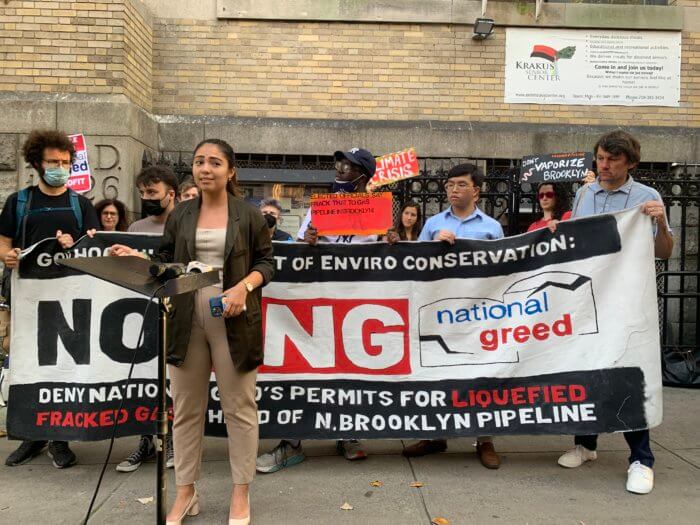
Last month, the National Resources Defense Council submitted its analysis of National Grid’s CLCPA study for four of its pending rate cases, including the downstate case that includes the vaporizers.
NRDC found the study “grossly inaccurate,” according to its analysis, which specifically criticizes the company for not including the impacts of recent federal and city climate laws that limit emissions. In January, the DEC also asked that National Grid factor New York City’s ban on new gas hookups into its analysis.
Local elected officials came out strongly in opposition to the new vaporizers in the days ahead of the hearing. Councilmembers Jennifer Gutiérrez and Lincoln Restler introduced a resolution in the city council last week calling on the state to deny the rate hike and the permits. On Sept. 16, Gallagher sent a letter to Governor Kathy Hocul and Department of Public Service Chair Rory M. Christian asking that they reject the permits and rate hike.
The council resolution is “based on false premises and filled with inaccurate information and claims,” National Grid said in a Sept. 16 letter to Restler and Gutiérrez. The utility asked the councilmembers to withdraw the resolution “without delay.”
“The hearings have made it clear that our community does not support National Grid’s proposed vaporizers,” Restler said in response to the request. “This new fossil fuel infrastructure will be obsolete in just a few years and would take us in the opposite direction of achieving our climate goals. We are committing to building support and passing our resolution.”
Health and safety concerns and the vaporizers
Wednesday’s sessions saw many residents stand up to argue against the vaporizers on the grounds that they endanger public health both short and long-term. Kevin LaCherra, a local activist and fourth-generation Greenpointer, recalled the neighborhood’s industrial past and the impacts it still has on residents.
“It means that my grandpa worked in the factories that lined the banks of the creek, and my grandmother died of cancers that have taken family members of anyone that has lived here long enough,” LaCherra said. “Because when Standard Oil and Brooklyn Union Gas, which became National Grid, built their empire, it wasn’t for us. They left 30 million gallons of oil in the ground in Greenpoint … they poisoned the air and the water and the soil and they left us to deal with the consequences.”
Greenpoint is home to two federal Superfund sites — the Meeker Avenue Plume and Newtown Creek. National Grid is partially responsible for funding the cleanup of the latter site, which sits directly beside the Greenpoint Energy Center.
National Grid’s rate settlements fund about $71 million in environmental remediation projects annually in Brooklyn, Queens, and Long Island, according to a National Grid representative. Most of that money is spent in Brooklyn and Queens, said Chris Connelly, vice president of gas network operations at National Grid, at Wednesday’s meeting.
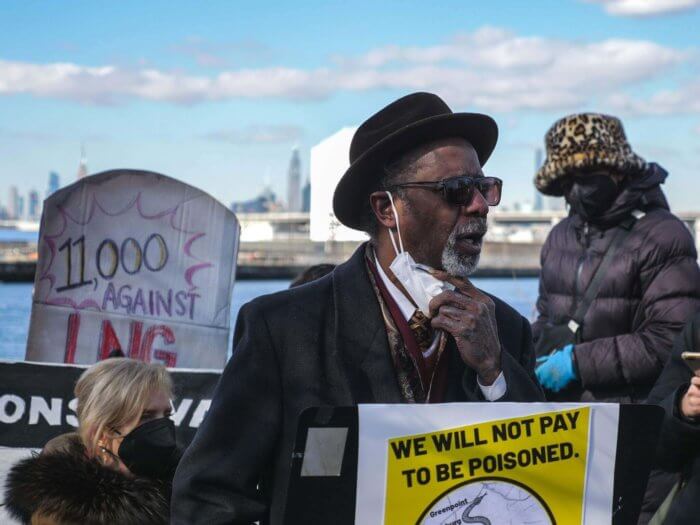
“With the safety issues and the health issues that this project contains, our community, this community of color, this low-income community, we consider this project to be a race massacre,” said Karen Leader, Cooper Park Resident Council Secretary, at Cooper Park Houses session. “Cooper Park Resident Council executive board members along with our residents demand that you move towards clean energy and stop looking to invest in fossil fuels.”
Elisha Fye, president of the resident council, called the development a “hurt community.”
“I’ve been here for 68 years and I’ve watched so many people occur medical conditions,” he said. “There’s other ways you can make money without harming us.”
All of the commentary submitted at the public sessions will be made available to the independent consultant, which is required to submit its report by Oct. 13, a National Grid spokesperson told Brooklyn Paper. The PSC is supposed to act within two months of receiving the report, but “has indicated it could take longer for complicated matters.”
“The renewable and fossil-free options we all support are not at scale to provide the energy that would be supplied by these units; and won’t be by the time we need them,” said National Grid spokesperson Karen Young after the sessions. “While some of the environmental groups and elected leaders have advocated against the vaporizers, the question we should be asking is what will they say to customers if there isn’t enough energy for customers on the coldest days of the year?”


